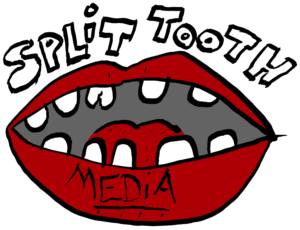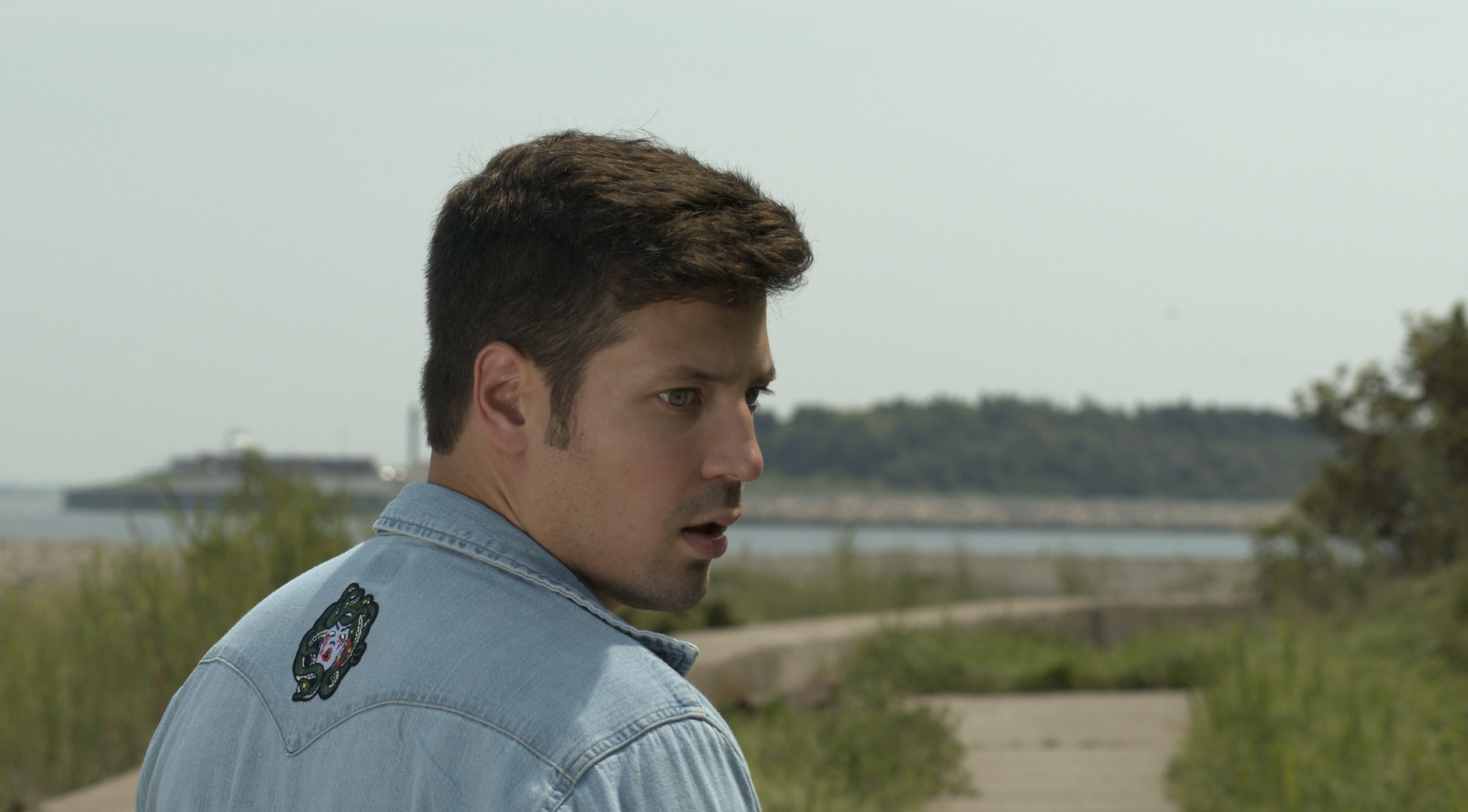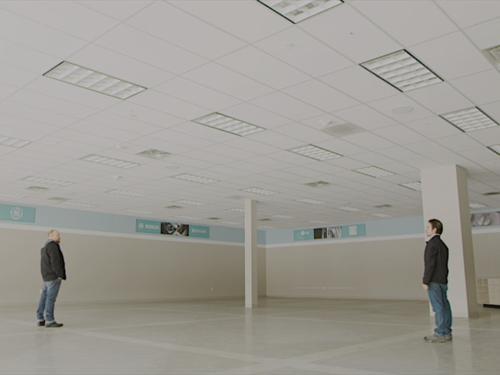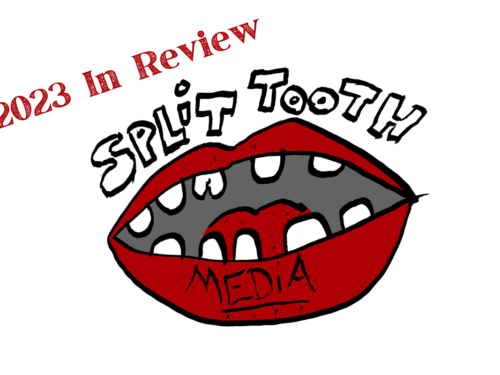The writer-director-star of the sci-fi comedy Super Beef discusses the film before its upcoming festival appearances
Super Beef, the debut feature film by director, writer, and star Nicholas D’Agostino, begins with a sandwich. It is a roast beef sandwich made with mayo, American cheese, and barbecue sauce. As a character unwraps one at the beginning of the film, barbecue sauce drips onto him as he savors it, each mouthful seeming to pull the character deeper into a trance-like state. Even for me, someone who detests mayo and American cheese, the sight of this sandwich on screen is tantalizing, and its hypnotic — or, maybe, narcotic — appeal is manifest.
This fleshy, messy sandwich is called the Super Beef — or, more commonly, just “beef” — and it comes from an area in Massachusetts known as the North Shore. This also happens to be where Super Beef is set, and where Nick D’Agostino is from. D’Agostino stars in the film as Hondo, a guy concerned with almost nothing except drugs, alcohol, and getting himself a beef.
Hondo’s quest for the latter is continuously interrupted by the plot he finds himself embroiled in, which involves his collaboration with a clandestine government program testing mind-control technologies on Americans and his slow awareness of a secret society and its ritualistic devotion to interplanetary entities. Making all of this harder, and funnier, is Hondo’s narcoleptic condition that keeps him from making much heroic progress, but it also keeps him from knowing too much about what’s going on around him.
As we watch Hondo deal with his situation, the symbolic value of the film’s title falls into focus. It seems impossible to eat one of these heaping sandwiches without getting covered in it, each bite creating one little mess after another. This is not so different from our disoriented protagonist finding himself party to one dangerous and maddening situation after another even as he tries to sort things out for himself.
I sat down with D’Agostino to talk about the making of Super Beef and what it means to him to bring together his lifelong passion for science fiction, body horror, and paranoid thrillers in a darkly funny film.
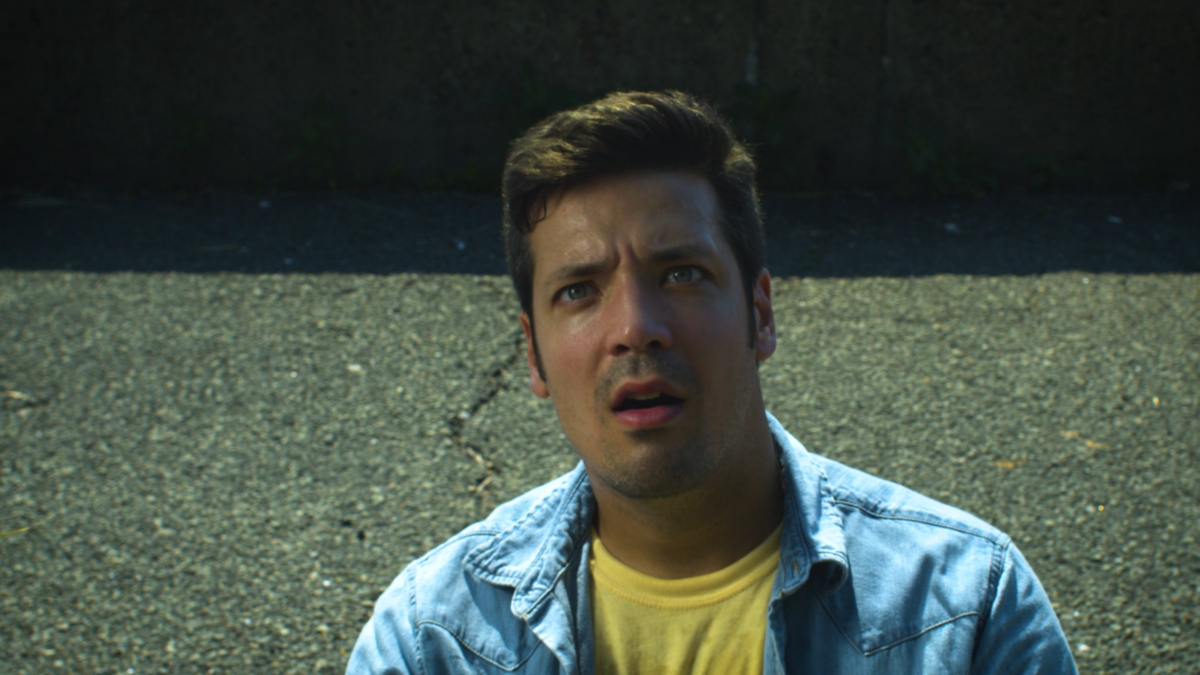
Split Tooth Media: So much of Super Beef’s charm comes from its setting of the North Shore outside Boston, Massachusetts. It feels like you have a personal attachment to the region, and the film could not take place anywhere else. What was it about this region that you wanted to capture in Super Beef?
Nick D’Agostino: I grew up in Winthrop, which is on the North Shore, and such a huge part of growing up was eating super beef sandwiches, from late night snacks that my dad would bring home, to trips to Revere Beach, [you] get a roast beef on a half-day [of school]. People from around here are obsessed with them. So this was kind of a love letter to super beef sandwiches, but also a love letter to Winthrop. There’s a unique look to it. Winthrop has that scenic beach vibe, and we’re also close to the city so you can see the cityscape. It has recognizable landmarks, like the red, white, and blue water tower, and the waste treatment plant on Deer Island. And obviously, the ever-present planes coming in and landing at Logan Airport, which is right there. If you come to Winthrop, you’re going to automatically hear the planes. For me they’re just like a background thing now. They were annoying when I was editing, but they add a little bit of visual charm to it. And summertime in Winthrop automatically makes our cinematography a little more pretty.
It looks so wonderful in those opening moments of the film, or when your character is taking his various journeys to get a super beef sandwich. Also, the sandwiches — I’ve never had one, but they also look very, very good.
Oh, you have to have one. What’s great about them is that they taste delicious, but they look so sloppy.
When the first character bites into the beef and what looks like blood just starts dripping down, it sets the tone so perfectly. It is talking about serious things, but it has this excessive or self-aware, or very affectionate sensibility to it, which is what I found refreshing about Super Beef.
Yeah, that’s definitely something I wanted to come across because I didn’t just want it to be a collage of all my inspirations, which you can’t help. It adds a personal flavor that is connected, not just to me, but the region. Anyone who is from there and sees that image of the beef knows how it tastes, how it feels, how messy it is, how many napkins they’ll need. But it has also connected with different people in different states who don’t know what the beef is who are thinking, ‘Damn I want one of those,’ and, ‘What’s going on here?’ They’re intrigued by it in both senses.
Super Beef is reverential to and deferential of genres that are sort of out of time now: There is a clear Phillip K. Dick inspiration to the story and to the visuals; there are aspects of David Cronenberg body horror; and there are aspects of political and paranoid thrillers, all of which should be very topical genres now, but are more associated with the 1970s or 1980s. What drew you to bring these influences together for Super Beef?
I think what ties together all three of those — Cronenberg body horror, Phillip K. Dick, and definitely the 1970s paranoid thriller — is unpredictability married with plausibility. In general, that’s what I think makes really good sci-fi. Audiences should feel like they have no idea what’s gonna happen, only that they’re going to see some things they’ve never seen before, but that the film will make it seem plausible without dipping too far into fantasy. And similarly with the paranoid thriller, at the beginning of a good one, there’s a great setup and I just get such glee knowing that in two hours from now there will be a conclusion. It doesn’t even need to be super satisfactory, but I’m just happy to be along for the ride. I think that ties all three of those together, and definitely what I was hoping to do with Super Beef as well.
It probably also speaks to you having it set in this very local environment. It’s a bit outlandish of a story, exaggerated in some ways, but it has a kind of lived-in experience. This is something you can imagine happening to someone like the main character of Super Beef, a guy who’s just so checked out all the time. And what I appreciated so much about how you handled the government mind control plotline of the film is that there’s never a sense of one evil, menacing figure who’s in control of everything. It’s these minor bureaucrats or functionaries who don’t really have any power, but they do have control over your character, Hondo. And that does feel like it corresponds to how people are absorbed into these bigger systems or sinister machinations outside of their own control.
And that’s the extra level of plausibility in Phillip K. Dick’s work, too, where a lot of it came from his real life and the paranoid thoughts he had. He would exaggerate them and suture the sci-fi element onto a bunch of drugged-out ’60s guys hanging around who were vulnerable to the conspiratorial mindset. That’s why his work feels so real, and even when I read that as a teenager I could see my friends and I sitting around and feeling that way. So I wanted an element of that with Hondo and his friends. And Hondo is the perfect character where you can see him being taken advantage of. Maybe he also feels bad about it, but maybe not so sure.
He does seem like a good person at base. He doesn’t want to be involved in anything or do anything bad, but he also doesn’t want to be aware that he’s involved in anything. We’re all kind of complicit in various things and we don’t always want to accept being responsible or being aware.
I think everybody has a way to disconnect like that, whether it be a vice or something more innocent like the media they consume. For Hondo it’s kind of a multitude of things. He uses alcohol, drugs, and an ever-present search for beef. But I think another thing is the fact that he’s narcoleptic and we kind of never really explain that. He’s almost like a possum. When things get too heavy or he can’t really face reality he kind of taps out and goes unconscious. So I think that everybody has that sort of Hondo narcolepsy in whatever way they have it. Just to disconnect.
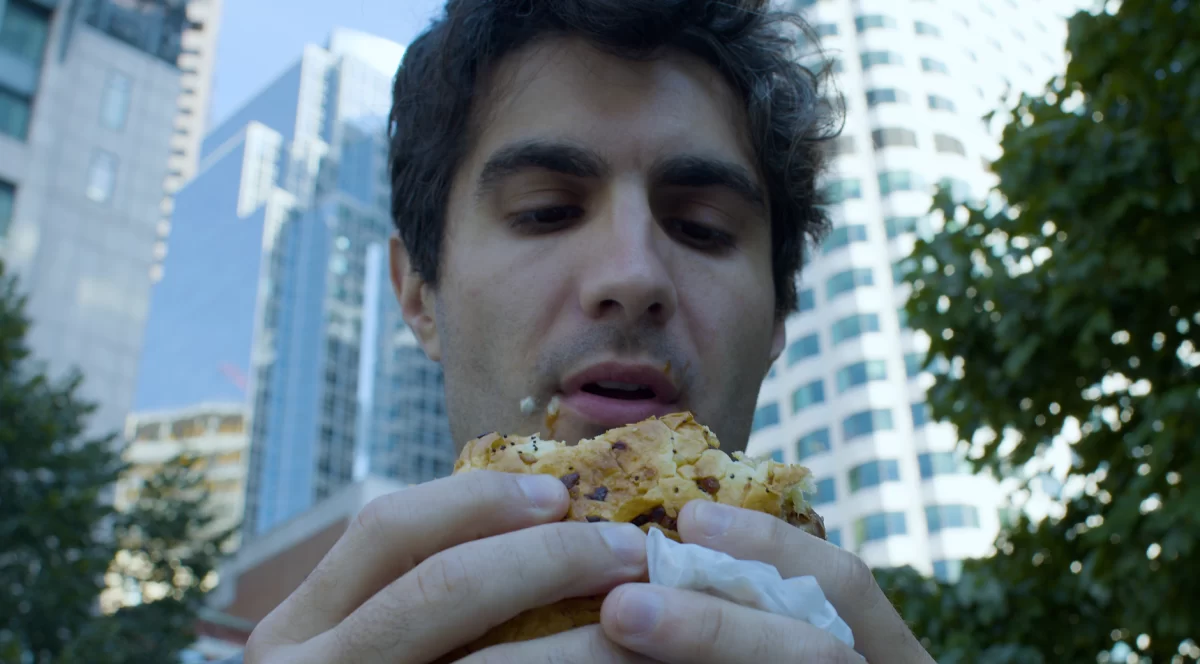
At what point did you realize that you were going to play Hondo? And what was that experience like to play him while also directing yourself? It seems like an impossible task to me, especially because you’re in every scene.
I’m not sure how it is for other writers, but on the first draft I see myself as every character, despite age, ethnicity, gender. It’s such a stream of consciousness thing that I just see myself as each character. And it just so happened that even as I was shaping all the other personalities of characters, I just kept seeing myself as Hondo. I knew the cadence with which he’d say something, I knew the kind of physicality that I wanted to bring to it.
And also there’s just the practical nature of it, like you said. Hondo’s in every single scene, and I knew that I was gonna have to be present for every shoot and it was such a micro-budget film. With the stress of trying to schedule actors, it made it so much easier for me to just play that part and avoid some of that scheduling stuff. Shooting was very difficult. I’m not sure how people do that. I wish I could have spent more time directing the other actors and more time behind the scenes.
I was very lucky to have my good friend Joe Shacar as the director of photography. He is great in that he is such a technical person, but he’s also artistic. I could lay out a bunch of storyboards, and he’s able to just go with that. Or if I didn’t do storyboards and had to explain to him what I’m looking for in a scene, he could bring his own eye to it and assist in that way. With how weird some of the things we had to shoot were, I needed to focus on being in character, or on a special effect, and Joe was so good about taking a lot of the duties behind the camera.
Related: David Cronenberg’s The Brood: Psychoplasmic Violations And Familial Crises by Frankie Vanaria
I was impressed that you were able to not only direct this movie while writing it, acting in it, and overseeing everything, but also that it’s funny. Not only is the film funny, but it’s the right kind of funny for the material.
I’m glad that you found it funny because I wasn’t sure that people would. I obviously have the utmost respect and affection for Philip K. Dick and Cronenberg and all that, so I’m not poking fun in any way, but I also didn’t want to take myself too seriously. I also knew I wasn’t going to be able to write a movie that’s just insanely laugh-out-loud funny at every stop, but I did want it to be almost like a perpetual chuckle from the audience. It works with the story and it feels so plausible with the character. But then when we showed it in Florida at the BizarroLand Film Festival and the audience was really cracking up. I really didn’t think that was gonna happen.
But if you read A Scanner Darkly it’s humorous, but it’s dark humor. There’s this melancholy over it and I wanted to maintain a bit of melancholy in Super Beef, especially towards the end of the movie. But Dick is somehow able to nail both ends so well, and I think A Scanner Darkly (2006), the Richard Linklater adaptation, went a little more in the slapstick direction, a little goofier. You read the book and there’s some funny moments for sure because Dick was a funny guy, but it’s a lot heavier than the adaptation is. So I definitely wanted it to be a little bit of a lighthearted movie throughout.

There’s a moment when you pass out and you fall to the floor. It doesn’t look like a pratfall, it looks like you actually did fall. Did you ever injure yourself?
No injuries, but I definitely didn’t take the safety precautions with my own body that I would with anybody else in the role. I didn’t mind putting myself in jeopardy. There were some hard falls on floors and various surfaces but I never hurt myself. Although, when we were doing the foley work I had to repeatedly fall to try to get the noise, I couldn’t find a good substitute for the noise of my landing on tile. Dropping things just didn’t work, so I was like, ‘I’m gonna drop on this tile.’ And doing it over and over again I definitely had some bruises. No real injuries though.
Well, it was worth it.
Yeah, obviously it’s a character thing like we mentioned with the narcolepsy. But also there’s a practical reason for that too, where it’s just an easy way for me to end a scene. Just have Hondo pass out.
I think it establishes a good rhythm. About how long was the project from start to finish?
I came up with that whole beginning sequence, sans beef, back when I was 19 years old and walking around Boston. The movie then would’ve been called “The Squid in Saturn.” And it was way darker, more gritty, more of a noir thing, and very cynical. So that had been kicking around in my head, and at some point in my 20s I thought — sitting around eating a beef, probably drunk — ‘Wouldn’t it be great if there was a character like the Big Lebowski but instead of a White Russian he just always has a beef?’ And then I kind of tailored the two together and obviously both changed quite a bit. So it’s been in the works since then, and we started filming in 2021.
It took two years to film. Then every single day that we shot a scene I’d stay up all night editing the scene. Which, maybe, is not the best way to do it. I’d prefer to have everything and go through that for a cohesive movie. But I couldn’t, I had no self-control. So I’d edit each scene after we shot it, so it was two years running of each of these scenes being edited as it went.
Hondo is endearing in many ways, but he also seems reluctant to learn any lessons or to grapple with what’s really going on. But for you, as a person and as a filmmaker, I get the sense that you did learn a lot in the process of making the movie. What are some of the things you learned about yourself or the process of filmmaking?
In some of my previous shorts that I made, a lot of the feedback that I got was that there were no ‘likable characters.’ So when I was focusing on later drafts of Super Beef, I didn’t want the audience to be like, ‘This guy is too stupid, I don’t want to follow his story.’ I hope I created a balance with where he is entertaining enough but you also do care about him and you want to go along on this journey with him. And even though there are some high stakes to it, I wanted to make it that at a certain point in the movie we’re just hanging out with Hondo. He’s just walking around and doing things, and the audience is like, ‘Are we still involved in this intricate plot with the government and aliens and all that stuff?’ With those thrillers we were talking about, you need the momentum and you want it to keep going, but I was hoping that Hondo and his likability could carry this movie.
In terms of filmmaking, of how I did it shooting on weekends for two years and constantly editing, there was a certain point where I needed someone else, my girlfriend [producer Dorian Magee], to tell me to set a date for when this had to be done. I could’ve kept going‚ I’d probably still be going now, trying to improve certain things. And then the film would be like this three-hour-long epic. So at a certain point it was smart to set a date. And that made me sit down and really map out not only the schedule for filming and all the special effects that I needed to shoot myself, but really wrap up the edit and the post-work. That took a long time. And I think that whatever the next feature or whatnot is, I would definitely try to make a schedule beforehand.
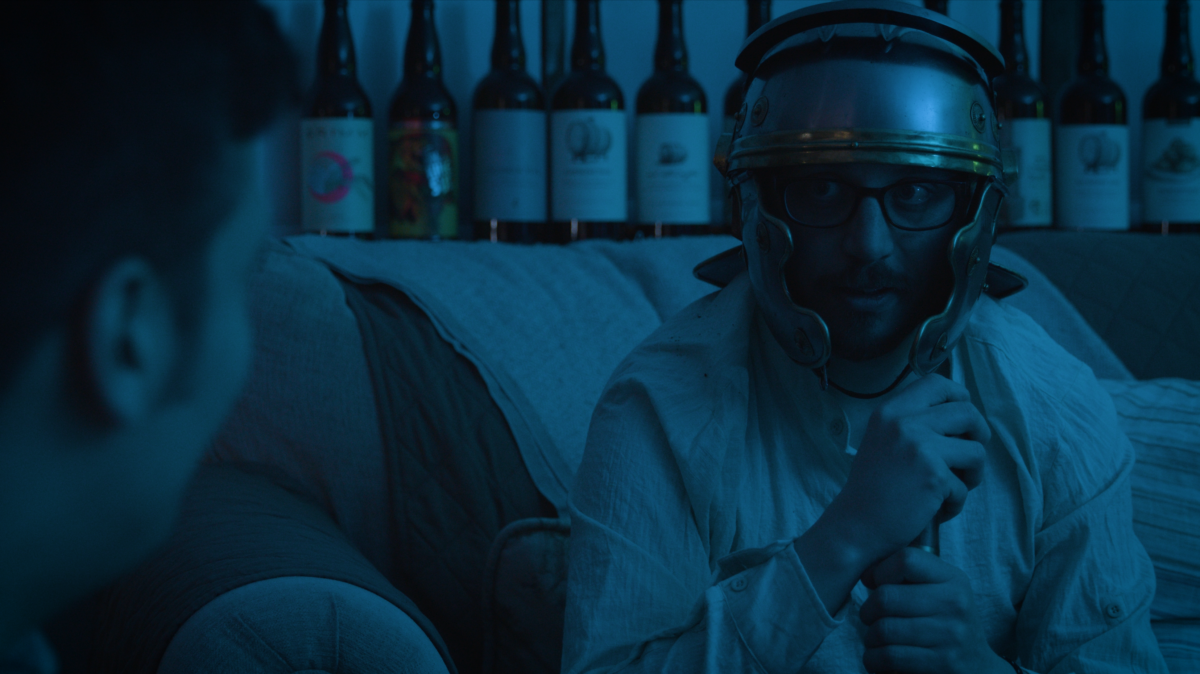
I also think you draw a lot of energy from your cast and the people behind the camera. It does seem that in every aspect of this movie, everyone seemed to be having fun with it.
There are quite a few of my friends and family both in front of and behind the camera for this movie. That definitely adds to it. Even some of the cast that I didn’t know before, who I knew through friends of friends, they became my friends, so I think it was easy for it to be a super laid-back set. I never put a ton of pressure on anyone except for myself. Everybody had a lot of fun except for me. I didn’t have fun when we were shooting, but I always had fun at night when I was looking at the footage and editing it. Shooting was stressful. I’m not sure what it was though, but I could be so stressed up to the point of calling action, and then the second I started using Hondo’s voice it was an instant relief for me. I was just able to embody that and not think about what was stressing me out.
But all my friends are funny people and easy to get along with, so I definitely think it translated to the movie. Everyone seemed like they wanted to be there and they didn’t seem annoyed to be put in these weird situations where I was making them say these really weird lines while feeding them a lot of super beef sandwiches behind the scenes — Vegans got other food. I’m glad that you saw that on screen because they had nothing but positive things to say. I don’t know if they were lying but they seemed to enjoy the process.
For me though, I knew that Joe was gonna nail what he was doing behind the camera and I had faith in my acting partners. So I really wouldn’t feel stressed when I was Hondo. And then for a while after that, if I’d get a little intoxicated, the Hondo voice would come back to me. But I think I’ve kicked it now. I’m not Austin Butler doing Elvis.
If you could pick out one scene or moment from Super Beef that’s your favorite, what would it be?
I think the prologue sequence, which I’ve always imagined as working independently as a short film. It would be an intriguing short film because it doesn’t give you a lot of answers. It starts the movie and leaves you wondering where it’s going, and feeds you a lot of visuals. And again, that’s something that’s been kicking around my head since I was 19. When we finally filmed it and I was looking back at the footage, it felt really good. The cherry on top was the music by Eric Gendron. He didn’t even see the scene. I just sent him a vibe that I was thinking of for it, and he sent the music back and it was so emotive of what I wanted it to be. And that wasn’t always the case.
A lot of the other parts, the action lines, didn’t really translate to what you see in the final version, but the opening really did. And I’m not going to say what happens, but I think the ending was pretty successful, too. So the beginning and ending are good. Everything in the middle might not be so great, but if you start people off interested and then have them leave the same way, that’s pretty good. (Laughs)
In terms of the special effects, what was the process like for achieving the kind of look that you wanted, and the feel that the special effects have?
Even after I decided to go for a more lighthearted tone, there’s a version of this movie where I would’ve gone weirder and more horrific. There were a lot of people in my ear who were suggesting that I don’t go that far and maybe turn people off. And I think that was totally right, and again, it was mostly my girlfriend who was suggesting that. So I did try to reel back a lot of my instincts to make it super gory and super weird. Hopefully we found a balance where it isn’t too weird, but a little off putting, and doesn’t make the movie feel totally disjointed or tonally all over the place. A lot of the special effects were practical. I love doing that stuff, I love having squishy tentacles and blood and goop. It’s a lot of fun — I feel like a kid filming that.
Is there anything else you’re currently working on or planning for the future?
I have, unfortunately, a handful of scripts at various stages of completion, from earlier stage drafts to finished ones. There’s one that I definitely would love to be my next project to bring to production. It would be another feature, and it would be another sci-fi movie, but I think I would want it to be a little more of a serious tone. I don’t want to put the cart before the horse because I haven’t finished the script, but it’s a sci-fi interpretation of a myth is all I’ll say.
Super Beef screens at The Phillip K. Dick Science Fiction and Supernatural Film Festival, Friday, April 5 at 9 p.m. Get tickets here
On Friday, April 26, the film plays The Massachusetts Independent Film Festival.
Get tickets here
